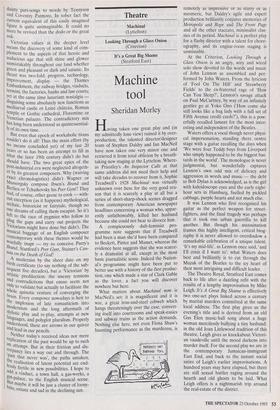Theatre
Machinal (Lyttelton)
Looking Through a Glass Onion (Criterion) It's a Great Big Shame (Stratford East)
Machine tool
Sheridan Morley
Having taken one great play and (in my admittedly lone view) ruined it by over- production, the talented director/designer team of Stephen Daldry and Ian MacNeil have now taken one very minor one and retrieved it from total oblivion by a breath- taking new staging at the Lyttelton. Where- as Priestley's An Inspector Calls at that same address did not need their help and will take decades to recover from it, Sophie Treadwell's 1928 Machinal was virtually unknown over here for the very good rea- son that it is scarcely a play at all but a series of short-sharp-shock scenes dragged from contemporary American newspaper headlines concerning a woman who, appar- ently unfathomably, killed her husband because she could not bear to divorce him.
A conspicuously daft-feminist pro- gramme note suggests that if Treadwell had been a man she'd have been compared to Beckett, Pinter and Mamet, whereas the evidence here suggests that she was scarce- ly a dramatist at all, except in the most basic journalistic sense. Indeed the Nation- al's programme might have been put to better use with a history of the first produc- tion, one which made a star of Clark Gable as the lover, a fact you will discover nowhere but here.
What matters about Machinal now is MacNeil's set: it is magnificent and it is war, a great iron-and-steel cobweb which hangs threateningly over the case, convert- ing itself into courtrooms and speak-easies and subway trains as the action demands. Nothing else here, not even Fiona Shaw's haunting performance as the murderess, is remotely as impressive or as starry or as mesmeric, but Daldry's agile and expert production brilliantly conjures memories of Metropolis and Rape and The Front Page and all the other staccato, minimalist clas- sics of its period. Machinal is a perfect play for a flashy director with a talent for chore- ography, and its engine-room staging is unmissable.
At the Criterion, Looking Through a Glass Onion is an angry, wiry and wired solo show devoted to the words and music of John Lennon as assembled and per- formed by John Waters. From the lyricism of 'Fool On The Hill' and 'Strawberry Fields' to the ex-fraternal rage of 'How Can You Sleep?', Lennon's savage attack on Paul McCartney, by way of an infinitely gentler go at Yoko Ono (`How come she still looks like a bag lady with a full set of Fifth Avenue credit cards?'), this is a pow- erfully recalled lament for the most inter- esting and independent of the Beatles.
Waters offers a vocal though never physi- cal impersonation, standing there centre stage with a guitar recalling the days when `We were four Teddy boys from Liverpool who simply happened to be the biggest bas- tards in the world'. The monologue is never judgmental, but wonderfully captures Lennon's own odd mix of delicacy and aggression in words and music — the debt to Bob Dylan is acknowledged, as is the girl with kaleidoscope eyes and the early eight- hour sets in Hamburg, fuelled by pickled cabbage, purple hearts and not much else.
It was Lennon who first recognised his guitar as the perfect weapon for street- fighters, and the final tragedy was perhaps that it took one urban guerrilla to kill another. But though his assassination frames this highly intelligent, critical biog- raphy it is never allowed to overshadow a remarkable celebration of a unique talent. `It's my mid-life', as Lennon once said, 'and I'll crisis if I want to': what Waters does best and brilliantly is to cut through the Muzak of the Beatles to the icy heart of their most intriguing and difficult leader.
The Theatre Royal, Stratford East comes back to life after a dazzling refit with the results of a lengthy improvisation by Mike Leigh. It's A Great Big Shame is effectively two one-act plays linked across a century by marital murders committed at the same local address. The first play gives us the evening's title and is derived from an old Gus Elen music-hall song about a huge woman mercilessly bullying a tiny husband: in the old Joan Littlewood tradition of this theatre, Leigh gives us knockabout Victori- an vaudeville until the mood darkens into murder itself. For the second play we are in the contemporary Jamaican-immigrant East End, and back to the instant social satire of Leigh's earlier improvisations. A hundred years may have elapsed, but there are still sexual battles raging around the hearth and old ghosts to be laid. What Leigh offers is a nightmarish trip around the real-estate of the district.


































































 Previous page
Previous page